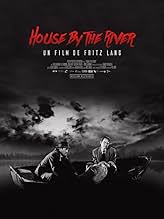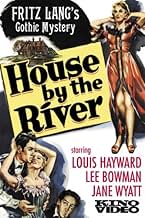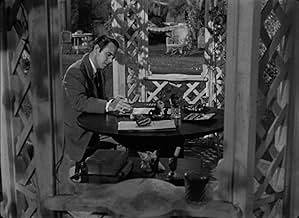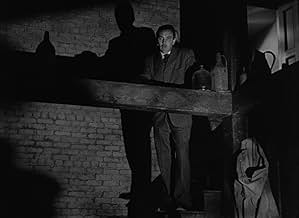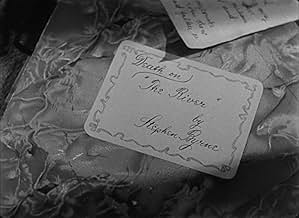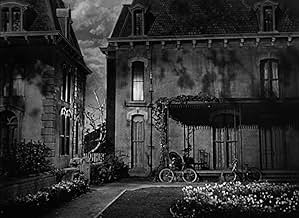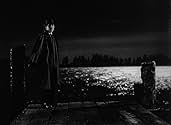IMDb-BEWERTUNG
7,0/10
4608
IHRE BEWERTUNG
Ein verwirrter Schriftsteller ermordet ein Dienstmädchen, nachdem sie sich seinen Vorschüssen widersetzt. Der Autor bittet die Hilfe seines Bruders, die Leiche zu verstecken, und beobachtet,... Alles lesenEin verwirrter Schriftsteller ermordet ein Dienstmädchen, nachdem sie sich seinen Vorschüssen widersetzt. Der Autor bittet die Hilfe seines Bruders, die Leiche zu verstecken, und beobachtet, wie der Bruder zum Hauptverdächtigen wird.Ein verwirrter Schriftsteller ermordet ein Dienstmädchen, nachdem sie sich seinen Vorschüssen widersetzt. Der Autor bittet die Hilfe seines Bruders, die Leiche zu verstecken, und beobachtet, wie der Bruder zum Hauptverdächtigen wird.
Bob Burns
- Courtroom Spectator
- (Nicht genannt)
Edgar Caldwell
- Square Dancer
- (Nicht genannt)
Edward Clark
- Minor Role
- (Nicht genannt)
Frank Dae
- Col. Davis
- (Nicht genannt)
Empfohlene Bewertungen
House By The River was a simple tale masterfully brought to the screen by Fritz Lang in his best conventional yet classy style. It was shot on a shoestring budget for Republic but a brooding atmosphere was captured beautifully by intelligent production and marvellous period sets on sharp nitrate film stock. Even the studio shot scenes of the garden with long shots of the bricky houses are fascinating to sink into.
Louis Haywood plays a budding writer with pretensions to Art and dubious morals who accidentally murders his lowly servant girl and drags his weaker brother into the mess to help him out. The story is simply played out to the bitter end, and although I wish the police angle could have been given more prominence it's completely logical. The part the River plays isn't as large as the House, but it's a darkly inspired mix; I've always wondered what colour the wallpaper was. Haywood often played ambivalent characters, however there's no ambivalence here in his portrayal of Stephen Byrne he's an evil swine all right. When it's all done you should be left with admiration for a director who could make a little go such a long way, with the help of a great team and cast of course!
It deserves more attention than it gets maybe the simple descriptive title didn't help it win immortality, otoh a more eye-catching "Strangled In The Dark" wouldn't have been as good either! This is one of those little films to treasure and something to revel in at the cinema or late at night on TV with the lights off for maximum effect.
Louis Haywood plays a budding writer with pretensions to Art and dubious morals who accidentally murders his lowly servant girl and drags his weaker brother into the mess to help him out. The story is simply played out to the bitter end, and although I wish the police angle could have been given more prominence it's completely logical. The part the River plays isn't as large as the House, but it's a darkly inspired mix; I've always wondered what colour the wallpaper was. Haywood often played ambivalent characters, however there's no ambivalence here in his portrayal of Stephen Byrne he's an evil swine all right. When it's all done you should be left with admiration for a director who could make a little go such a long way, with the help of a great team and cast of course!
It deserves more attention than it gets maybe the simple descriptive title didn't help it win immortality, otoh a more eye-catching "Strangled In The Dark" wouldn't have been as good either! This is one of those little films to treasure and something to revel in at the cinema or late at night on TV with the lights off for maximum effect.
House by the River is something of an anomaly; it's more of an old-dark-house Gothic than the grittier dramas, from Fury to Beyond A Reasonable Doubt, which Fritz Lang made in his American period. (The location of this house is a worrisome and amateurism anomaly, too; the conventions, milieu and some of the accents suggests that it's an English country estate, but much else argues that the film takes place in the U.S.) Would-be writer Louis Hayward, getting flirtatious with the maid in the absence of his wife (Jane Wyatt), accidently strangles her when she resists his advances. His brother (Lee Bowman) reluctantly agrees to cover up for him and help sink the body in the sinister, ever-present river that runs by the edge of the property; the resulting scandal of the disappeared servant bolsters the writer's flagging career. When suspicion begans to gather around his innocent brother, Hayward, by now seriously demented, couldn't be more pleased. But then Wyatt comes across a hidden manuscript; Hayward (you see), flushed by his phoney success, resolves to write "what he knows...."
Edward Cronjager's heavily shaded cinematography and Georges Anthiel's brooding score help fill out Lang's dark, clammy vision, making the river -- forever disgorging its flotsam and jetsam -- a principal character in the action. House by the River is a good old-fashioned thriller, particularly in its Gothic closing scenes, but it's not in a class with Lang's films at the top of his American form, like Scarlet Street, The Big Heat or Human Desire.
Edward Cronjager's heavily shaded cinematography and Georges Anthiel's brooding score help fill out Lang's dark, clammy vision, making the river -- forever disgorging its flotsam and jetsam -- a principal character in the action. House by the River is a good old-fashioned thriller, particularly in its Gothic closing scenes, but it's not in a class with Lang's films at the top of his American form, like Scarlet Street, The Big Heat or Human Desire.
House by the River (1950)
A straight up Gothic murder scenario with echoes of the 1945 "Spiral Staircase." A family with two brothers at odds with each other is living in a house and one of them is a murderer. And at first only the audience knows who. Their relative isolation on the banks of a wide river means only that they will have little help when danger occurs. The neighbors and police and few and far.
Louis Hayward plays the main character, Stephen Byrne, a writer and a bit of a self-important cad. Hayward has an odd style on film during this era, attractive and likable at first, but with an acerbic humor and some kind of unworkable stiffness, as if you know he's always performing. But he's clever about it, and when you realize he isn't meant to be exactly lovable, he's pretty well cast. Byrne's brother, wife, and maid all come through with solid if uninspired performances, and you wonder exactly what held everyone back. Fritz Lang has many more successful melodramas than this one.
I think the weakness is largely the raw material, the story itself, which is a bit straight forward. One brother commits a murder, the other is drawn into helping cover it up, and then the tensions build between them as an inquest raises questions. It has moments, but there are no further twists that work. The ending is out of character, almost comical in its false (and unlikely) horror.
Along the way, though, are a series of nice scenes, inside the house at night, along the river at night, at a party meant to hide the killer's guilt, and so on. The music is especially helpful in jabbing the audience at key moments. American Georges Antheil was a composer famous for his avant-garde pieces in the 1920s in Europe before settling into a Hollywood routine. You can detect, and appreciate, the edge he brings to the score. The photography by contrast is good without rising up to the possibilities of these kinds of settings--the house, the river, the dock, all have more dramatic potential that we just don't see.
A straight up Gothic murder scenario with echoes of the 1945 "Spiral Staircase." A family with two brothers at odds with each other is living in a house and one of them is a murderer. And at first only the audience knows who. Their relative isolation on the banks of a wide river means only that they will have little help when danger occurs. The neighbors and police and few and far.
Louis Hayward plays the main character, Stephen Byrne, a writer and a bit of a self-important cad. Hayward has an odd style on film during this era, attractive and likable at first, but with an acerbic humor and some kind of unworkable stiffness, as if you know he's always performing. But he's clever about it, and when you realize he isn't meant to be exactly lovable, he's pretty well cast. Byrne's brother, wife, and maid all come through with solid if uninspired performances, and you wonder exactly what held everyone back. Fritz Lang has many more successful melodramas than this one.
I think the weakness is largely the raw material, the story itself, which is a bit straight forward. One brother commits a murder, the other is drawn into helping cover it up, and then the tensions build between them as an inquest raises questions. It has moments, but there are no further twists that work. The ending is out of character, almost comical in its false (and unlikely) horror.
Along the way, though, are a series of nice scenes, inside the house at night, along the river at night, at a party meant to hide the killer's guilt, and so on. The music is especially helpful in jabbing the audience at key moments. American Georges Antheil was a composer famous for his avant-garde pieces in the 1920s in Europe before settling into a Hollywood routine. You can detect, and appreciate, the edge he brings to the score. The photography by contrast is good without rising up to the possibilities of these kinds of settings--the house, the river, the dock, all have more dramatic potential that we just don't see.
House by the River is directed by Fritz Lang and adapted by Mel Dinelli from A.P. Herbert's novel The House on the River. It stars Louis Hayward, Jane Wyatt, Lee Bowman & Dorothy Patrick. Music is by George Antheil and photography by Edward J. Cronjager.
Novelist Stephen Byrne (Hayward) makes a play for the house maid and unwittingly kills her when she repels his advances. Enlisting the help of his disabled brother, John (Bowman), to dispose of the body in the river, Stephen suddenly finds that the publicity surrounding the maid's disappearance has put him in vogue again. In fact he finds his muse sufficiently stoked enough to craft another novel. But as easy as Stephen finds it easy to have no conscience, the opposite is the case with John, and with the river refusing to hold its secrets, something is going to give.
Working out of Republic pictures, Lang refused to let the low budget production hamper his vision of a bleak Cain & Abel like Gothic-noir-melodrama. He did, however, meet some resistance when requesting that the maid be played by a black woman, which was quickly shot down by nervous executives at the famed "B" movie studio. House by the River is far from being among the best of Lang's work, but the final product is still a triumph considering it's basically a three character piece set virtually in just two locations. It scores high on eerie atmosphere and finds Lang dealing in moral bankruptcy/responsibility and the eye for an eye mentality. Ushered into the narrative, too, is a Lang fave of people irked by loving someone they can't have. These themes allow the director to gloss over the simple script and dally in some truly arresting visuals.
Aided considerably by Cronjager's (Desert Fury/CanyonPassage) chiaroscuro photography, Lang's film is a lesson in how to maximise effect from limited sets. The actual house on the river, and that of the neighbour (resplendent with creepy scarecrow in garden), has a very disquiet feel to it, fronted by shimmering water that carries the dead carcass' of animals, it's a most haunting setting. And the eerie atmosphere continues inside the house, where shadows work their wonders and Antheil's music sticks rigidly (and rightly) to the creaky house formula. The cast don't pull up any trees, but they don't need to. Hayward is perhaps too animated for a study in snide villainy, but it works and he has a nice line in visual mocking. The rest fall in line for what is required, with the best of the bunch being Ann Shoemaker as nosey neighbour Mrs. Ambrose.
Once a hard to find film, House by the River is now easily accessible after gaining a DVD release (the print is fine, some age spotting and crackles, but completely watchable). It's a film that is easily recommended to Lang and Gothic house based movie purists. Driven by a despicable protagonist and cloaked in a creepy noirish vibe, it deserves to now gain a better and more appreciative audience. 7.5/10
Novelist Stephen Byrne (Hayward) makes a play for the house maid and unwittingly kills her when she repels his advances. Enlisting the help of his disabled brother, John (Bowman), to dispose of the body in the river, Stephen suddenly finds that the publicity surrounding the maid's disappearance has put him in vogue again. In fact he finds his muse sufficiently stoked enough to craft another novel. But as easy as Stephen finds it easy to have no conscience, the opposite is the case with John, and with the river refusing to hold its secrets, something is going to give.
Working out of Republic pictures, Lang refused to let the low budget production hamper his vision of a bleak Cain & Abel like Gothic-noir-melodrama. He did, however, meet some resistance when requesting that the maid be played by a black woman, which was quickly shot down by nervous executives at the famed "B" movie studio. House by the River is far from being among the best of Lang's work, but the final product is still a triumph considering it's basically a three character piece set virtually in just two locations. It scores high on eerie atmosphere and finds Lang dealing in moral bankruptcy/responsibility and the eye for an eye mentality. Ushered into the narrative, too, is a Lang fave of people irked by loving someone they can't have. These themes allow the director to gloss over the simple script and dally in some truly arresting visuals.
Aided considerably by Cronjager's (Desert Fury/CanyonPassage) chiaroscuro photography, Lang's film is a lesson in how to maximise effect from limited sets. The actual house on the river, and that of the neighbour (resplendent with creepy scarecrow in garden), has a very disquiet feel to it, fronted by shimmering water that carries the dead carcass' of animals, it's a most haunting setting. And the eerie atmosphere continues inside the house, where shadows work their wonders and Antheil's music sticks rigidly (and rightly) to the creaky house formula. The cast don't pull up any trees, but they don't need to. Hayward is perhaps too animated for a study in snide villainy, but it works and he has a nice line in visual mocking. The rest fall in line for what is required, with the best of the bunch being Ann Shoemaker as nosey neighbour Mrs. Ambrose.
Once a hard to find film, House by the River is now easily accessible after gaining a DVD release (the print is fine, some age spotting and crackles, but completely watchable). It's a film that is easily recommended to Lang and Gothic house based movie purists. Driven by a despicable protagonist and cloaked in a creepy noirish vibe, it deserves to now gain a better and more appreciative audience. 7.5/10
Intense period thriller about a writer, Stephen Byrne (played by Louis Hayward), who lives in - yeah, you guessed it - a house by the river; with lovely yard and gazebo, yet oddly dark as the film opens with the sky clouded, shadows cast across scenery, haunting music, a dead animal floating by on the glistening water, and a black widow spider crawling over his writing. We meet the attractive, blonde servant girl, Emily, who Stephen clearly has a lustful eye on from the get-go. By the next scene, he tries to kiss her coming down the stairs after bathing in his tub, and, well, she screams and he "accidentally" strangles her. With his brother assisting him, they put her body in a big sack and sink her in the river, then follows the cover-up of the murder.
Well, this film is quite interesting, dark and suspenseful - there's a lot going on here. The print I saw looked strikingly full of sharp black and white contrast. The photography in this makes the film menacing with blackened rooms lit only by candle light casting dark, sharp shadows across the walls, some extreme camera angles up stairs and down halls, shots of faces seen only in mirrors, extreme close-ups, and sweat dripping on the face of a nervous murderer.
Well, this film is quite interesting, dark and suspenseful - there's a lot going on here. The print I saw looked strikingly full of sharp black and white contrast. The photography in this makes the film menacing with blackened rooms lit only by candle light casting dark, sharp shadows across the walls, some extreme camera angles up stairs and down halls, shots of faces seen only in mirrors, extreme close-ups, and sweat dripping on the face of a nervous murderer.
Wusstest du schon
- WissenswertesFritz Lang originally wanted a black woman to play the role of Emily Gaunt, but the producers refused.
- PatzerThe women are dressed in turn of the century type clothing but the men are wearing modern hats and suits.
- Zitate
John Byrne: You must be very, very ill Stephen...
Stephen Byrne: Ill?
- VerbindungenFeatured in Le documentaire culturel: Das Verhängnis des Doktor Frankenstein (2018)
- SoundtracksTurkey in the Straw
(uncredited)
American folk song
Author unknown
Top-Auswahl
Melde dich zum Bewerten an und greife auf die Watchlist für personalisierte Empfehlungen zu.
- How long is House by the River?Powered by Alexa
Details
- Erscheinungsdatum
- Herkunftsland
- Sprache
- Auch bekannt als
- House by the River
- Drehorte
- Produktionsfirma
- Weitere beteiligte Unternehmen bei IMDbPro anzeigen
- Laufzeit
- 1 Std. 23 Min.(83 min)
- Farbe
- Seitenverhältnis
- 1.33 : 1
Zu dieser Seite beitragen
Bearbeitung vorschlagen oder fehlenden Inhalt hinzufügen


